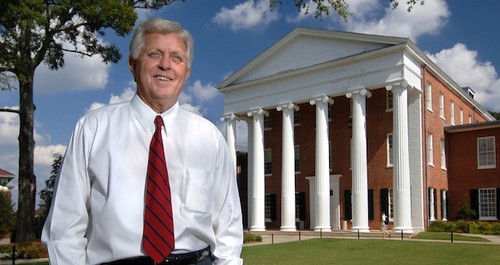
Robert C. Khayat
Retired UM Chancellor Robert C. Khayat (B.A.Ed. 61, J.D. 67) was inducted into the SOE Hall of Fame in May 2017. Khayat, who served as UM chancellor from 1995 until his retirement in 2009, helped shape the university’s history by raising more than $900 million in gifts, helping establish the Sally McDonnell Barksdale Honors College, attracting a Phi Beta Kappa Chapter, increasing enrollment by 43 percent and hosting a presidential debate among many other accomplishments.
To top it off, he was also a great teacher. First as an eighth-grade teacher in Moss Point and then as a longtime professor at the UM School of Law. We recently sat down with Khayat to speak about his time as an undergraduate at the SOE and the impact it had on his life.
Will you share an experience that had a profound impact on you as an undergraduate?
The first major impact occurred when I was a freshman in 1956. We had something called the University Scholars Program. A woman named Dorris Raymond ran the program. It’s was like what the Honors College is today, but really small. One day, Dorris asked me if I would like to go to Memphis to the opera. I’m from the Mississippi Gulf Coast and I knew what an opera was but I had never been to one or heard one. So I said, “Yes ma’am, I would really like to go.” So, I went and I had good fortune because the opera was La Bohème. It has the same effect on me as a circus or carnival. That night at Ellis Auditorium in Memphis, I was thinking, “You know what, this is a big world. It’s not just in Moss Point or Oxford. It’s not all Hank Williams or Nat King Cole.” That opera opened my eyes to the world. It was like I had blinders on and the opera took them off.
What advice do you have for people who want to teach?
If that’s what you really want to do, and if it makes you happy, I doubt that you could find a better job than teaching. I’ve taught eighth grade science and I’ve taught law school. I am so thankful that my road took me to education and higher education and getting to teach.
I was lucky enough to start teaching at the law school when I was young enough to relate to the students. They were mature and they were there by choice. They wanted to well. My job was to lead them and watch them learn. Providing challenges and leadership for young people is one of the best things you can do.
You can’t be wrapped up in money or how much other people are making. Our society has some interesting values. We tend to measure success by wealth. We turn the minds of our children over to teachers who have low pay. We turn our personal property and safety over to the police and we don’t pay them very much. We turn our souls over to preachers and we don’t pay them very much. You would think our safety, our minds and our children would be pretty important, but they aren’t represented on the value chart the way other professions are. But, what will give you peace and satisfaction is being happy with your job. I was always happy with my job in the classroom.
What are you most proud of?
As far as Ole Miss is concerned, I think the creation of the Honors College and Phi Beta Kappa would be two success stories that I’m most proud of. I was the guy that said, ‘Let’s do this.’ A lot of people said we couldn’t, but I knew we could. Being in Mississippi, I was accustomed to people telling me I couldn’t do something. We don’t have a very good self-perception as a state. In some instances, it’s for a good reason. But, if we put our minds to something good, we can really do it. We did it at Ole Miss over and over. I’ve been a student and a faculty member and chancellor here, we have had one remarkable event happen after the other.
What does it mean to you personally to be inducted into the Hall of Fame?
I know many people who have been inducted and I’m so pleased to be a part of it. But the truth is, this gives me an opportunity to thank the School of Education and Dr. Sylvester Moorhead for the degree I received in 1961. When I was 22, I was in Vicksburg and very sick in the hospital. Dr. Moorhead got in his car—this was before four lane highways—and drove to Vicksburg. I was lying in the bed seriously anesthetized and he confirmed my degree when I wasn’t even aware he was there. When I woke up and realized what had happened two-to-three weeks later, I thought it was one of the most generous things that someone could do. It was one of the most moving moments of my academic career.
Read more from Khayat and other SOE Hall of Fame members in the 2017 edition of our Education Edge Alumni Magazine.